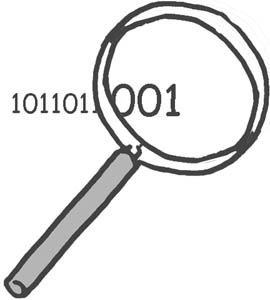![[Metroactive Features]](http://metroactive.com/features/gifs/feat468.gif)
[ Features Index | Silicon Valley | Metroactive Home | Archives ]
All Information, All the Time
By Annalee Newitz
MY FAVORITE new example of authoritarian obfuscation has to be the Defense Advanced Research Project Agency's new techno-surveillance system called Total Information Awareness. I just love that name: it brings a sarcastic smile to my lips every time I read it. Maybe it's because I keep imagining the words Total Information Awareness appearing in a pop-under ad for wireless webcams--you know, the ones allegedly for "home security" that are advertised with pictures of scantily clad babes in swimming pools whose movements are presumably being tracked by your hidden webcam.
The Total Information Awareness project is brought to you by John Poindexter, a name that's a blast from the past for raised-in-the-1980s types like myself. Poindexter was Ronald Reagan's national security adviser, and his nouveau Cold War politics are hip again. He was also convicted (and later unconvicted) of lying to Congress during the Iran-Contra hearings. After the 9/11 terrorist attacks, Poindexter drafted his plans for Total Information Awareness. During this fiscal year, the Pentagon has given $10 million just to develop several projects under the auspiciously named new digital spy program. The projects themselves could be sucking up hundreds of millions of dollars over the next few years.
What, you may ask, is Total Information Awareness going to do to secure our beloved homeland? Will we all become so aware that we beam out of existence like light-filled beings in a Spielberg flick? If you want to know more, a demented flowchart explaining TIA exists at (www.darpa.mil/iao/TIASystems.htm), in which we're told that TIA's goal is to "detect, classify, ID, track, understand, pre-empt." What will be detected, of course, are possible terrorists. Using advanced data-mining tools, Poindexter hopes to locate prototerrorists in the data stream before they can do any harm. By tracking credit card purchases, plane flights, housing choices and all kinds of insane bits of data, Poindexter is hoping that TIA's info-power tools can detect patterns that point up alarming confluences of activity: a city-dweller who purchases a crop-dusting plane and large amounts of toxic chemicals, for instance; or a leftist newspaper reporter who purchases a lot of books about bioterrorism and several Linux servers.
The idea behind TIA is to track people by understanding, as Poindexter puts it, "how they fit into models." It's the same principle that advertisers use to target particular markets: you look at the movements and spending habits of people online and attempt to build a profile of who they are so that you can predict their behavior. Advertisers try to predict spending behavior; Poindexter wants to predict criminal behavior. And as he says in the short description of TIA, he ultimately wants to "pre-empt" criminal behavior.
Many commentators have already pointed out the creepy ways one might compare Poindexter's plan with the plot of Minority Report, in which police officers use ESP to predict "future crimes" and arrest potential criminals before anyone gets hurt. (As an amusing aside, it's interesting to note that in Minority Report, the ACLU is fighting the department of future crimes for much the same reasons they and other civil liberties groups like the Electronic Frontier Foundation are fighting TIA-related projects in real life.)
TIA, I think, represents the first stage in a new kind of digital authoritarian politics--call it Totalitarian Information Awareness, if you will. Coupled with the Homeland Security Act, which makes hacking a crime punishable by life imprisonment, TIA draws a stark line between who is allowed to own and manipulate information and who is not. It divides the world into people who are data points and those who are data miners. For some reason, TIA reminds me of a scene from the movie Blue Velvet, where evildoer Frank rapes damsel-in-distress Dorothy. As he subdues her, he screams, "Don't look at me! Don't you fucking look at me!" His power comes, in part, from his ability to look at her when she cannot look at him.
The data point cannot look the data miner in the face. Her digital body, the vast quantity of information that represents her life online, is open for the data mining tools to exploit and view unobstructed. And that's how TIA will rob us of our power and autonomy: by turning us into things that can be looked at and examined but who cannot look back at the people and devices that are placing us under surveillance. We will be hacked, but we cannot hack back.
[ Silicon Valley | Metroactive Home | Archives ]
Copyright © Metro Publishing Inc. Metroactive is affiliated with the Boulevards Network.
For more information about the San Jose/Silicon Valley area, visit sanjose.com.
![]()

Techsploits
Annalee Newitz ([email protected]) is a surly media nerd who has not forgotten the difference between privacy and security.
Send a letter to the editor about this story to letters@metronews.com.
From the November 27-December 4, 2002 issue of Metro, Silicon Valley's Weekly Newspaper.